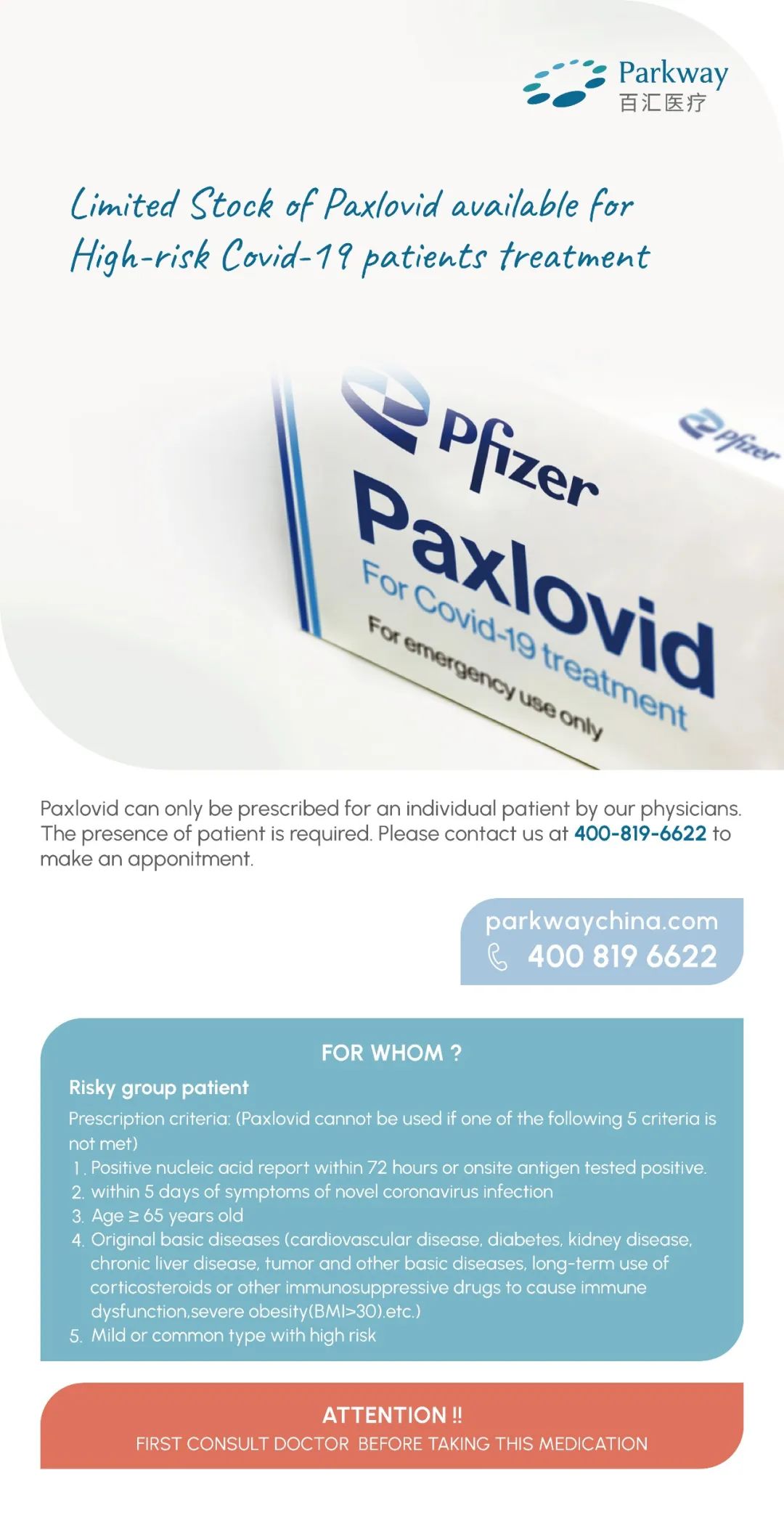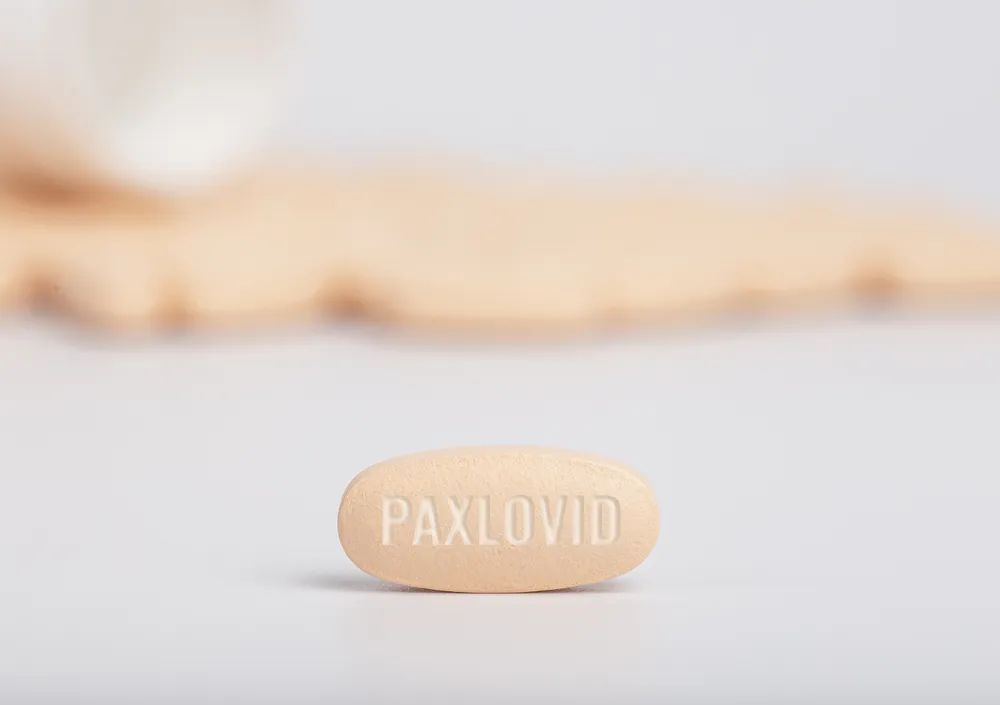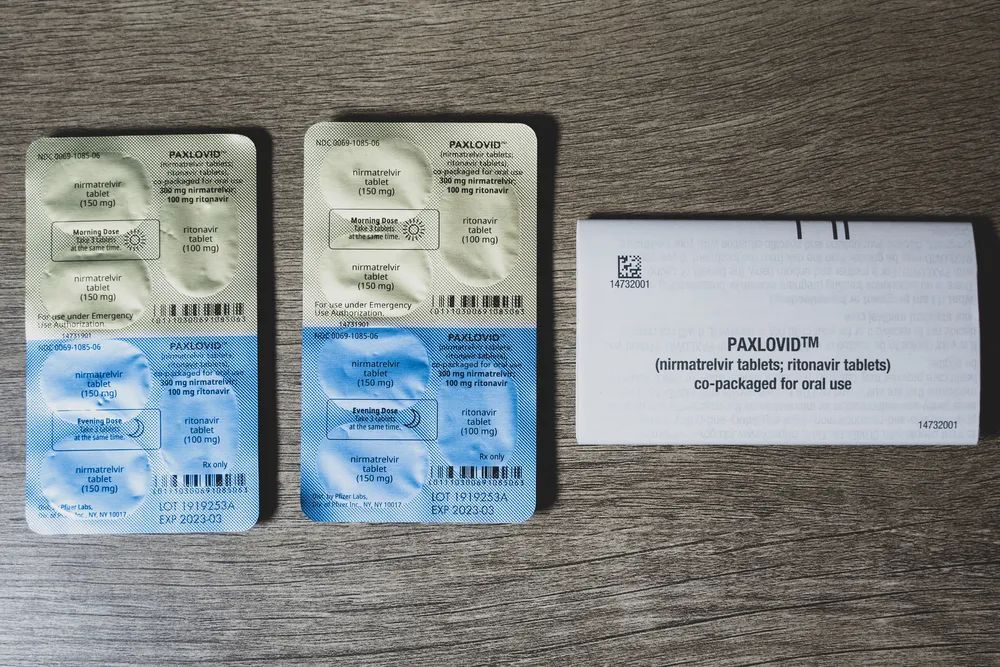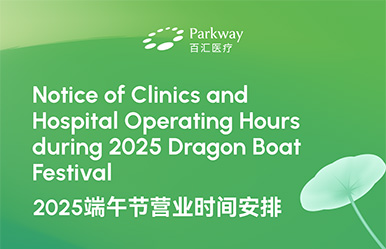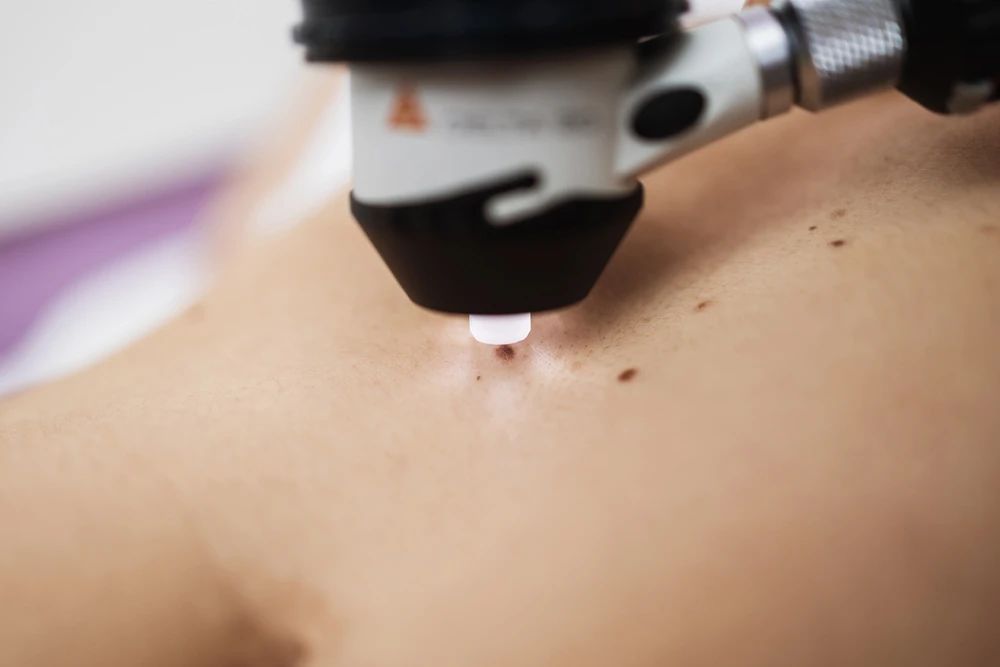Limited Stock of Paxlovid available for Risky Covid-19 Patients
2023-01-05
PARKWAY 百汇医疗 1. How is the efficacy of Paxlovid? In the clinical trial published in April 2022, it had demonstrated an 89% reduction in the risk of hospitalization and death in unvaccinated people who were at high risk for proression to severe Covid-19 receiving treatment in 3 days after symptom onset. Studies in people who have been vaccinated also confirmed the effectiveness of Paxlovid. In November 2022, the CDC reported on a real-world study that showed adults who took Paxlovid within five days of a COVID-19 diagnosis had a 51% lower hospitalization rate within the next 30 days than those who were not given the drug. The study included people who had been vaccinated or had a previous infection. The effivacy of Paxlovid is higher than other COVID-19 treatments. 2. How does Paxlovid work? Paxlovid is an antiviral therapy that consists of two separate medications packaged together---nirmatrelvir and ritonavir. Nirmatrelvir is the key factor to fight the virus, which inhibits a key enzyme that the COVID virus requires in order to make functional virus particles. After nirmatrelvir treatment, the COVID virus that is released from the cells is no longer able to enter uninfected cells in the body, which, in turn, stops the infection. The other is ritonavir, it reduces nirmatrelvir’s metabolism in the liver. As a result, nirmatrelvir’s anti-viral works longer in the body to fight against the infection. 3. Is Paxlovid similar to Tamiflu? As we know, Tamiflu is an antiviral drug that we use to treat seasonal flu and is effective for Flu A and Flu B. Paxlovid and Tamiflu are both oral antiviral pills should be given early in the begining. Tamiflu is taken twice a day for five days, and it must be started within 48 hours of onset. Paxlovid is required to be started in the first 5 days of symtoms occur. Clinical data available for Tamifly mainly focused on whether Tamiflu could shorten the length of flu illness, whearas research concentrate on preventing severe type caused hospitalization and death. 4. Can anyone who have a positive COVID-19 test get a Paxlovid? The FDA authorized Paxlovid for people ages 12 and older who weigh at least 88 pounds. But in order to qualify for a prescription, you must also have had a positive COVID-19 test result and be at high risk for developing severe COVID-19. That means you must either have certain underlying conditions (including cancer, diabetes, obesity, or others) or be 65 or older (more than 81% of COVID-19 deaths occur in in this group). The more underlying medical conditions a person has, the higher their risk for developing a severe case of COVID-19, according to the CDC. 5. When should I start Paxlovid? How do I take Paxlovid? It has been recommended that Paxlovid shoule be taken within five days of developing symptoms. Like all antivirals, Paxlovid works best early in the course of an illness—in this case, within the first five days of symptom onset. You take 2 pink nirmatrelvir tablets and 1 white ritonavir tablet together at the same time twice daily for five days for a full course that adds up to 30 pills. Swallow the tablets whole. Do not chew, break, or crush the tablets. If you miss a dose of PAXLOVID within 8 hours of the time it is usually taken, take it as soon as you remember. If you miss a dose by more than 8 hours, skip the missed dose and take the next dose at your regular time. Do not take 2 doses of PAXLOVID at the same time. 6.Does Paxlovid prevent Covid-19 infection? No. Paxlovid doesn’t prevent you from catching Covid-19. It is used to treat mild to moderate Covid-19 in people with positive viral testing and who are at high risk of progression to severe Covid-19. 7. What are the side effects from Paxlovid? Most people who take Paxlovid should not experience serious side effects. Possible side effects include an altered or impaired sense of taste, diarrhea, increased blood pressure, muscle aches, abdominal pain, and nausea. But people should stop taking Paxlovid and contact health care provider right away if they experience signs of an allergic reaction: skin rash, trouble swallowing or breathing swelling of the mouth, lips, or face, throat tightness, hoarseness. Since Paxlovid is cleared by the kidneys, dose adjustments may be required for patients with mild-to-moderate kidney disease. For patients with severe kidney disease—or who are on dialysis—or those with severe liver disease, Paxlovid is not recommended; the levels of the drug can become too high and could cause increased side effects. 8. Does Paxlovid interact with other medications I am taking? There is a long list of medications Paxlovid may interact with and doctors will give advice to patient whether there is a need to temporarily discontinue the medications, change the medication, or regulate the dosage. While in some cases, doctors may not prescribe Paxlovid because these interactions may cause serious complications. The following lists are the contraindications from Pfizer Paxlovid fact sheet. Tell your doctor about all the medicines you take, including prescription and over-the-counter medicines, vitamins, and herbal supplements. Your doctor can tell you if it is safe to take Paxlovid with other medicines. PAXLOVID is contraindicated with drugs that are highly dependent on CYP3A for clearance and for which elevated concentrations are associated with serious and/or life-threatening reactions : Alpha1-adrenoreceptor antagonist: alfuzosin Antianginal: ranolazine Antiarrhythmic: amiodarone, dronedarone, flecainide, propafenone, quinidine Anti-gout: colchicine Antipsychotics: lurasidone, pimozide Benign prostatic hyperplasia agents: silodosin Cardiovascular agents: eplerenone, ivabradine Ergot derivatives: dihydroergotamine, ergotamine, methylergonovine HMG-CoA reductase inhibitors: lovastatin, simvastatin Immunosuppressants: voclosporin Microsomal triglyceride transfer protein inhibitor: lomitapide Migraine medications: eletriptan, ubrogepant Mineralocorticoid receptor antagonists: finerenone Opioid antagonists: naloxegol PDE5 inhibitor: sildenafil (Revatio®) when used for pulmonary arterial hypertension (PAH) Sedative/hypnotics: triazolam, oral midazolam Serotonin receptor 1A agonist/serotonin receptor 2A antagonist: flibanserin Vasopressin receptor antagonists: tolvaptan PAXLOVID is contraindicated with drugs that are potent CYP3A inducers where significantly reduced nirmatrelvir or ritonavir plasma concentrations may be associated with the potential for loss of virologic response and possible resistance. PAXLOVID cannot be started immediately after discontinuation of any of the following medications due to the delayed offset of the recently discontinued CYP3A inducer: Anticancer drugs: apalutamide Anticonvulsant: carbamazepine, phenobarbital, primidone, phenytoin Cystic fibrosis transmembrane conductance regulator potentiators: lumacaftor/ivacaftor Antimycobacterials: rifampin Herbal products: St. John's Wort (hypericum perforatum) Article published at China Science Communication, contributed by Dr. Branny Jiang, Pediatrician of Parkway. Parkway China Parkway is part of IHH Healthcare, one of the largest healthcare providers in the world by market capitalization. Its operates 80 hospitals with more than 15,000 beds in 10 countries. Parkway first arrived in China in 2004. In 2006, Parkway opened its first medical center in Shanghai, bringing world-renowned quality healthcare to China. Through the acquisition of World Link Group in 2007, Parkway becomes Shanghai's largest foreign-owned medical network. Parkway China is a leading international healthcare provider. With a team of nearly 100 internationally trained physicians, we now operate 8 medical facilities conveniently located in Shanghai, Chengdu and Hong Kong offering more than 40 specialties. We work closely with the best local hospitals with which we share our knowledge and expertise to ensure the best services possible to our patients. We have established direct billing services with over 50 insurance companies. We provide both outpatient and inpatient care for adults and children. Our services include: Family Medicine, Adult Medicine, Pediatrics, Gynecology, Dentistry, Cardiology, ENT, Gastroenterology, Ophthalmology, Dermatology, General Surgery, Orthopedics & Sports Medicine, Urology, Beauty & Skin Care, Psychiatry, Traditional Chinese Medicine & Acupuncture, Osteopathy, etc.